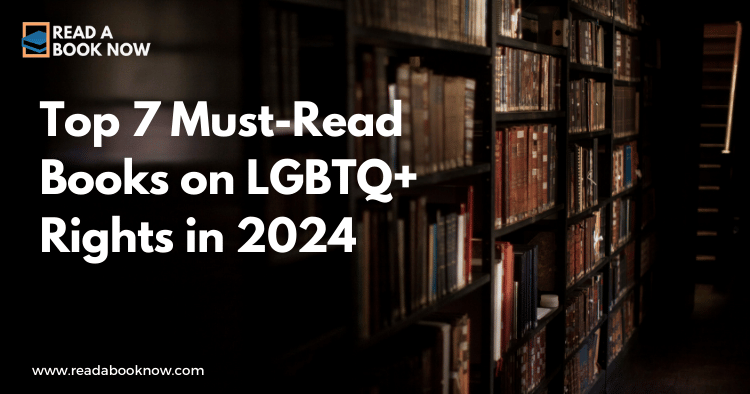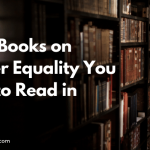Table of Contents
- Introduction
- Book 1: “The Gay Revolution: The Story of the Struggle” by Lillian Faderman
- Book 2: “Queer (In)Justice: The Criminalization of LGBT People in the United States” by Joey L. Mogul, Andrea J. Ritchie, and Kay Whitlock
- Book 3: “Gender Trouble: Feminism and the Subversion of Identity” by Judith Butler
- Book 4: “Homosexuality: A History” by David F. Greenberg
- Book 5: “The New Gay Marriage” by William Eskridge Jr.
- Book 6: “Transgender History” by Susan Stryker
- Book 7: “The Queer Bible Commentary” edited by Tina Beattie
- Conclusion
- FAQs
Introduction
In recent years, LGBTQ+ rights have increasingly become a focal point in the fight for social justice across the globe. Literature plays a crucial role in understanding the historical context, ongoing struggles, and triumphs of the LGBTQ+ community. Whether you’re an ally, a member of the community, or simply someone looking to educate yourself, the following seven books are essential reads for 2024. Each book provides unique insights and perspectives, making them invaluable resources for anyone interested in the history and future of LGBTQ+ rights.
“The power of literature lies in its ability to shape our understanding of the world and the lives of others.” – Anonymous
Book 1: “The Gay Revolution: The Story of the Struggle” by Lillian Faderman
Lillian Faderman’s “The Gay Revolution” is a comprehensive exploration of the fight for LGBTQ+ rights in the United States from the 1950s to the present day. Faderman meticulously documents key events, individuals, and movements that have shaped the landscape of LGBTQ+ rights, providing a detailed narrative that is both engaging and educational.
Why Read It?
- Historical Context: It offers an in-depth understanding of how societal attitudes toward LGBTQ+ individuals have evolved.
- Personal Stories: Faderman weaves personal narratives into the historical framework, making it relatable and impactful.
For more information on LGBTQ+ history, you can visit the American Civil Liberties Union (ACLU).
“Understanding our history is crucial to shaping a better future for LGBTQ+ rights.” – Lillian Faderman
Book 2: “Queer (In)Justice: The Criminalization of LGBT People in the United States” by Joey L. Mogul, Andrea J. Ritchie, and Kay Whitlock
This groundbreaking book examines how the criminal justice system disproportionately affects LGBTQ+ individuals. The authors highlight the intersectionality of race, gender, and sexual orientation, providing a compelling argument for the need for reform.
Key Takeaways
| Aspect | Insight |
|---|---|
| Criminalization | LGBTQ+ individuals face unique challenges in the justice system. |
| Intersectionality | The authors discuss how race and gender amplify these challenges. |
This book is essential for understanding the systemic issues that continue to affect the LGBTQ+ community.
“Justice should not be a privilege for some, but a right for all.” – Joey L. Mogul
Book 3: “Gender Trouble: Feminism and the Subversion of Identity” by Judith Butler
Judith Butler’s “Gender Trouble” is a seminal text that challenges traditional notions of gender and sexuality. Butler’s idea that gender is performative has sparked critical conversations about identity, making this book a must-read.
Why It’s Important
- Theoretical Framework: It provides a philosophical basis for understanding gender fluidity.
- Cultural Impact: Butler’s work has influenced feminist and queer theories, making it a cornerstone in LGBTQ+ studies.
Dive deeper into gender theory at The Stanford Encyclopedia of Philosophy.
“Gender is not something we are, but something we do.” – Judith Butler
Book 4: “Homosexuality: A History” by David F. Greenberg
David F. Greenberg’s “Homosexuality: A History” offers a panoramic view of the history of homosexuality from ancient times to the modern era. The book challenges misconceptions and provides a nuanced perspective on the LGBTQ+ experience throughout history.
Highlights
- Cultural Insights: Greenberg examines how various cultures have understood and treated homosexuality.
- Debunking Myths: The book is insightful for those looking to dismantle stereotypes associated with LGBTQ+ individuals.
Explore more on LGBTQ+ history at History.com.
“History is not just what happened, but how it is interpreted.” – David F. Greenberg
Book 5: “The New Gay Marriage” by William Eskridge Jr.
In “The New Gay Marriage,” William Eskridge Jr. discusses the evolution of marriage equality in the United States. He outlines the legal battles and societal changes that led to the landmark Supreme Court decision in Obergefell v. Hodges.
Why This Book Matters
- Legal Insight: A thorough examination of the legal framework surrounding LGBTQ+ marriage rights.
- Cultural Shifts: Eskridge highlights how public opinion on marriage equality has transformed over time.
For more on marriage equality, visit MarriageEquality.org.
“Marriage equality is not just a legal issue; it is a matter of human dignity.” – William Eskridge Jr.
Book 6: “Transgender History” by Susan Stryker
Susan Stryker’s “Transgender History” provides a critical look at the history of transgender individuals in the United States, from the early 20th century to contemporary times. Stryker discusses key events, figures, and movements, making this book essential for understanding transgender rights.
Main Points
- Historical Perspective: The book addresses the complexities of transgender identity throughout history.
- Activism: Stryker highlights the activism that has paved the way for transgender rights today.
Learn more about transgender issues at Transgender Rights Toolkit.
“To understand the present, we must look to the past.” – Susan Stryker
Book 7: “The Queer Bible Commentary” edited by Tina Beattie
This unique book offers LGBTQ+ interpretations of biblical texts, challenging traditional religious views. Edited by Tina Beattie, it gathers contributions from various theologians and scholars, providing a fresh perspective on faith and sexuality.
Why It’s Unique
- Religious Insights: It addresses the intersection of faith and LGBTQ+ identities.
- Diverse Perspectives: Contributors offer a range of viewpoints, making it a rich resource for discussion.
For further exploration of LGBTQ+ religious issues, check out the Human Rights Campaign.
“Faith should be a source of inclusion, not exclusion.” – Tina Beattie
Conclusion
These seven books offer invaluable insights into the struggles, triumphs, and ongoing battles for LGBTQ+ rights. Whether you’re looking to educate yourself or deepen your understanding of the LGBTQ+ community, these reads are essential for anyone committed to equality and justice.
“Reading is a form of activism; knowledge is the key to change.” – Anonymous
FAQs
1. Why is it important to read about LGBTQ+ rights?
Reading about LGBTQ+ rights helps to foster understanding, empathy, and awareness of the challenges faced by the community. It is essential for allies and advocates alike.
2. Are these books suitable for beginners?
Yes! Each book provides a unique entry point into LGBTQ+ topics, making them accessible for readers new to the subject.
3. How can I support LGBTQ+ rights beyond reading?
You can support LGBTQ+ rights by participating in local organizations, advocating for policy changes, and promoting awareness through social media.
4. Where can I find these books?
These titles are available at most bookstores, online retailers, and local libraries. Check out Goodreads for reviews and recommendations.
By diving into these essential reads, you’re not just gaining knowledge; you’re joining a movement that champions equality, justice, and understanding for all. Happy reading!
Also look for resources on 10 Must-Read Feminist Classics That Changed Literature to further enrich your understanding of gender and rights.



